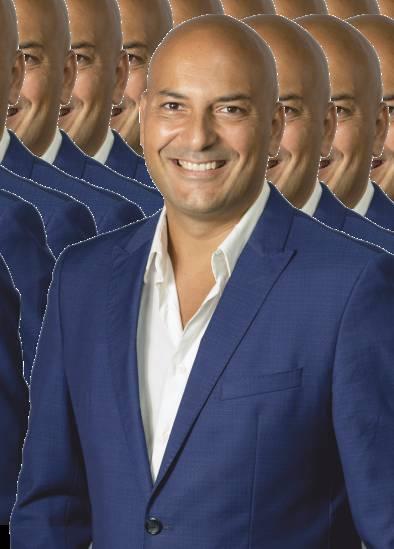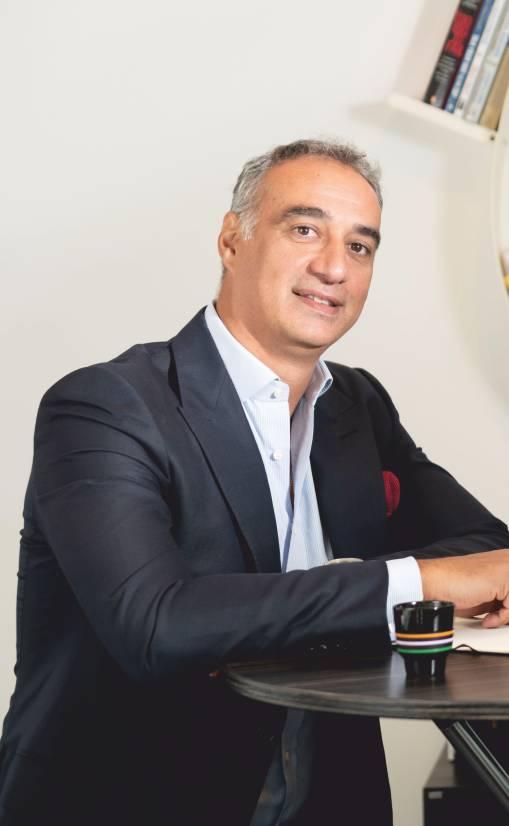
9 minute read
Triox Nano
Pioneers in point of care programmable medicine! presenting the ne
In an interview with Insights Success, Triox Nano's management describes its impeccable journey to become the first biotech company to develop a modularprogrammeddrug delivery platform. The company's revolutionary technology, termed S.M.A.R.T, an acronym for Stimuli Multi Adjusted Responsive Technology, or simply put “Programmable medicine” is based on combinations of DNA coding, DNA molecular machines and mesoporous nanoparticles. SMART offers the potential to add programming to almost any approved medicine that may in turn increase its efficacy exponentially.
Advertisement
Prominent opinion leaders and investors had been funding TrioxNano's development to date including the European commission through the prestigious H2020 Horizon program. Competing with over 1500 companies TrioxNano's technology won a non diluting grant of roughly $2.5 million USD. TrioxNano's all inclusive patents are granted around the world . Many believe this breakthrough technology may lead the way to the next healthcare revolution!
To create S.M.A.R.TTriox Nano had to first invent the modular hardware that will allow incorporation of many different medications, the software language which is based on DNA coding and the actual codes that will control the nano particle. The technology is expected to create a paradigm shift and highly impact human lives around the globe, transforming medicine from its current primitive analog state to a programmable digital modern era.
S.M.A.R.T creates a vast field of programmable nanoparticles that can deliver their payload to target tissues based on the software code that is uploaded to them. The final commercialized product is expected to be supplied with a list of common software codes. The treating physician will decide which codes to use and will easily upload them to the modular nanoparticle that incorporates the relevant medication. The doctor will have the option to upload a mixture of several codes into the same treatment based on the patient's clinical and pathologic profile.
Under the supervision of Joseph Farfara, Triox Nano's CEO, the company has progressed robustly in the last 3 years, broadening the type of medications that can be loaded into the platform, improving the capping characteristics and securing its IP with patents granted around the world.
Below are the highlights of the interview:
Can you explain to our readers what so exciting about Triox Nano work?
Joseph Farfara, Triox Nano's CEO “By the year 2020, thousands of APIs (Active Pharmaceutical Ingredients) had been developed to treat different diseases, yet not even one efficient modular technology was developed to deliver them accurately to their target! The most efficient way to do this is use programming abilities so that each API can have tens of programs to direct it to different targets upon request. If you compare this to the car industry its like everyone has been developing thousands of types of engines without finding a way to connect them to the wheels yet. Current delivery methods, such as Injections or tablets deliver only a small percentage of their original doses to the tissues requiring treatment, and instead, most of the dose arrives to healthy tissue causing severe toxicity.
Examples for our programing abilities include the TXN770 family of nanoparticles intended for the treatment of TNBC (Triple Negative Breast Cancer). TXN770 combines between a modular unit loaded with the chemotherapy doxorubicin, that is already approved for the treatment of TNBC and the ability to be programmed by a combination of different software codes that control its release according to common traits found in the patient's specific tumor such as high levels of Magnesium and high levels of ATP. Other programing options we are developing include high levels
Nano
of PD1, PARP and Nucleolin found to be high in subgroups of TNBC patients. This allows us to use the same modular particle that includes Doxorubicin and program it to react to different cancer traits. In parallel we have created other modular particle loaded with the chemotherapies Mitoxantrone and Docetaxel (that is approved already for TNBC) that can use the same software codes described above (Mg, ATP, PD1, PARP, Nucleolin).
We are focusing on TNBC Triple Negative Breast Cancer to prove our technology's benefits but expect it to be relevant for many other indications. We offer specific licenses to
the use of our S.M.A.R.T platform loaded with the
client's APIs (active pharmaceutical ingredient). This is relevant for many types of companies, those who have a medication that is effective but proven to be too toxic to be used, or for medications that require high doses to be effective, or in cases patent cliff issues have to be avoided. Our standard license agreements includes milestone payments and royalties fees, we offer our services for a fee to develop the asset until completion of the of In Vitro phase, expecting the companies to complete the In Vivo Tox and clinical trials.

What led to the inception of Triox Nano?
Answer Dr. Roy Farfara CTO and founder of TrioxNano
The inception of TrioxNano was at 2 AM after a long operation of a young kidney cancer patient. Our department was regularly accepting patients that other surgeons had given up on operating them due to the technical difficulties. We had the best techniques and technologies in Israel at the time (biologic glues, mannitol, hypothermia) we were taking out carefully tumor after tumor in the renal. We finished the surgery exhausted though we knew we did the best that can possibly be done. The patient kidney was not resected, we managed to take out all tumors and substantial bleeding avoided. Yet we understood that the patient ended
Roy Farfara, MD Founder & CTO

up having less than %20 of the original kidney parenchyma meaning he would most probably need dialysis in the near future. My grandfather Simon Farfara RIP who was an artisan taught me when I was a child that "The first step in every challenge is to find the best tools to complete it". Understanding that it is not possible that in the year 2013 we are trying to resect micron (one millionths of a meter) size cancer cells with centimeter size knifes while on the other hand treating with chemotherapy that is not specific enough thus causing substantial side effects. Being aware of the limitation of surgery (trying to resect micro meter size cancer cells with inch size knifes) and the limitations of non specific chemotherapies causing substantial toxicity made me understand at that moment that we are totally not using the right tools to achieve this goal, and set me out on this journey”
Describe Triox Nano and its cutting-edge technology.
Answer Dr. Ehud Saas head of biologic programming
Interestingly computers have been incorporated into everyaspect of our lives except medicine. TrioxNano has developed and patented a programmable nano delivery platform that can carry different medications, including chemotherapies, to their target tissue. The technology uses nanoparticles based on DNA machinery. These amazing machines are made from single-stranded DNA and RNA and allow us to program a modular particle with almost infinite possibilities. Once completed, the technology will enable the treating physician to upload the relevant DNA module per individual patient and precise the administered treatment based on his specific cancer traits. It is estimated that more than 1000 approved medication can be delivered by this programmable system and at least 500 unique programmed modules can be uploaded to them. This adds up to about half a million different options of unique treatments (in the case that only one code is uploaded per particle), in the case a combination of three codes is loaded and estimated 125 billion treatment options are created.
As a leading pharma and biotech solution providers, what contribution has been made by you?
Answer by Dr. Ofer Nusbaum head of chemistry biology interface.
TrioxNano is trying to create a paradigm shift in the way we treat disease. Programming is urgently need to enhance the treatment of patients. In the case of Cancer as an example, cancer cells develop different mutations in different organs of the same patient. On the other hand different cancer type share common pathways. For example the PD1 pathway is relevant for a small percentage of TNBC patients and larger percentage in many other cancer types, many are being treated with PD1 inhibitors. This translate into a need for modular programmed platform that can relate to common traits in different tumors and different mutation in the same patient. We believe we will be able to offer the world the first modular programmable nano delivery platform where the physician will be able to program the medicine he gives his patient, he will choose from a list of software codes that we will offer commercialy and upload it to an armantarium of medication he can choose from. Later on we plan to offer specific programming to less common cases that require specific softwares. Of note is that all the different chemotherapies are packed in the same modular nanoparticle.
Describe in brief about the work culture and the values that drive Triox Nano.

Joseph Farfara, Triox Nano's CEO
TrioxNano is driven by a team of highly intelligent hard working open minded scientist. All our staff have hands on experience of years in the industry. We are roughly divided to chemists and biologists that are integrators able to bridge the gap between these two worlds. As an Israeli company we try to think out the box and “cut to chase” as much as possible basing our decision on sound science.
What are the future aspirations of Triox Nano? What strategies are you undertaking to achieve those goals?
Answer Dr. Roy Farfara CTO and founder of TrioxNano
TrioxNano aspires to be the next Microsoft and IBM, on one hand creating "the operating system for computerized drug delivery" and on the other developing the hardware required to run the operation system and the code. We want to revolutionize the way patients are treated! To achieve this
goal our strategies include a hybrid business model where we develop our own drug candidate TXN770 (as a proof of concept) for the treatment of TNBC but are actively persuing to cooperate with others to incorporate their APIs (Active Pharmaceutical Ingredients) into our modular computerized platform.
How are you solving your customers' complex drug discovery challenges?

Answer Dr. Roy Farfara CTO and founder of TrioxNano
By incorporating their APIs into TrioxNano's S.M.A.R.T platform, our partners may be able to increase efficacy while using smaller doses, creating decreased toxicity, new IP and an exponential increase in value. This cooperation will importantly benefit humanity as thousands of medications can be improved which translate into improving human lifes!


What is your idea of Corporate Social Responsibility?
Joseph Farfara, Triox Nano's CEO
The hebrew saying "KOL HAMEZIL NEFESH ACHAT KEILU HEZIL OLAM U MELO'O," meaning he who saves one life is considered to save the world entire.
www.Smartriox.com Joseph@TrioxNano.com
“It is estimated that more than 1000 approved medication can be delivered by this programmable system and at least 500 unique programs can be uploaded to them. This adds up to about half a million different options of unique treatments (in the case that only one code is uploaded per particle), in the case a combination of three codes is loaded and estimated 125 billion treatment options are created."








